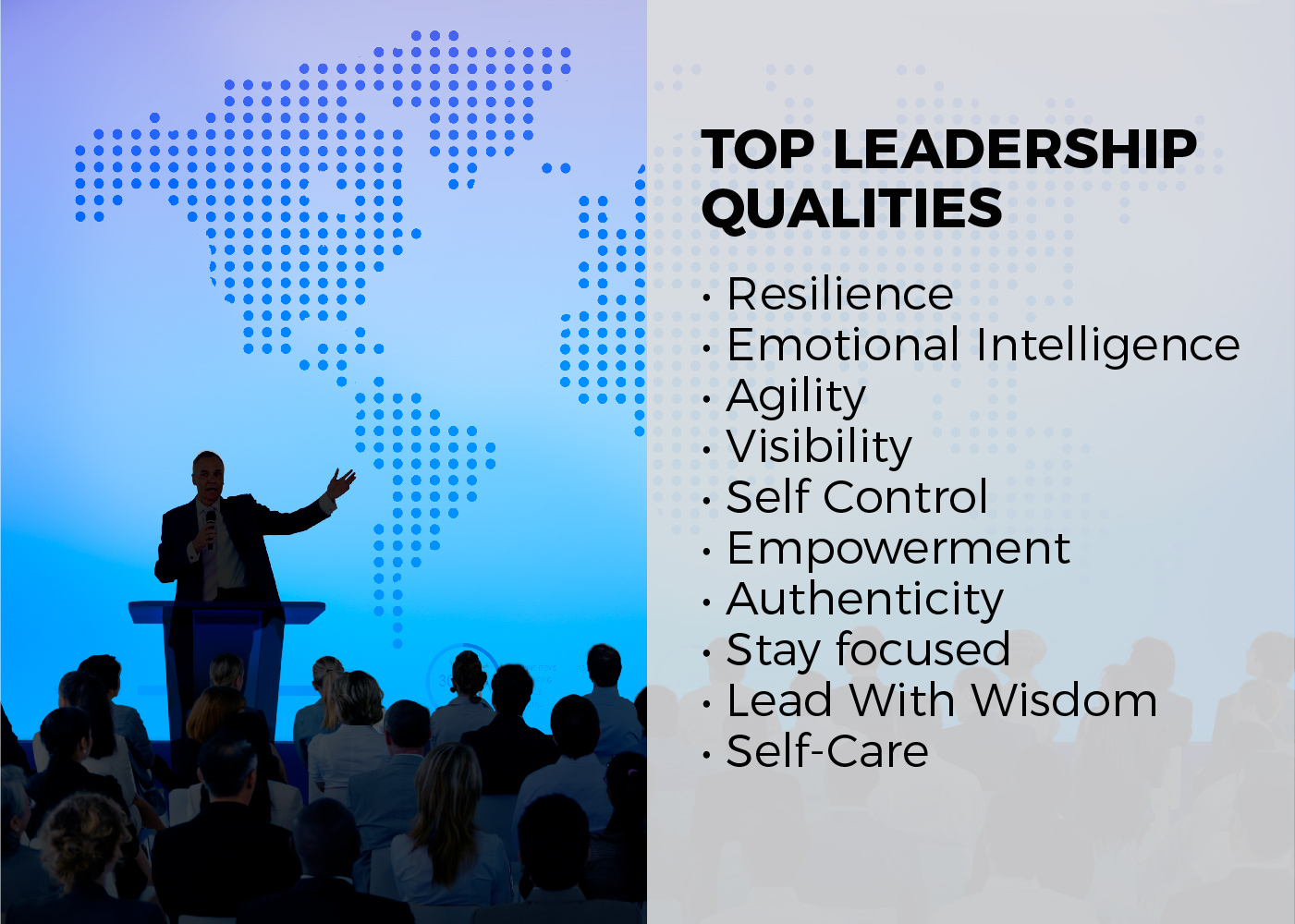Every business needs dynamic and prolific leaders to bring about a remarkable difference to the business environment and boost its bottom line. But, after a year of prolonged pressure, disruption, and drastic change in the work environment, there is a need for leaders to imbibe a different set of leadership qualities to lead their teams through the ongoing global pandemic.
Here are the top 10 leadership qualities for 2021 that leaders must possess to lead their flocks
effectively:
1. Resilience
When Amazon launched Echo, it received a good deal of criticism. But Jeff Bezos shook it off and remarked, “I’ve made billions of dollars of failures at Amazon.com”.

“Companies that don’t embrace failure and continue to experiment eventually get in the desperate position where the only thing they can do is make a Hail Mary bet at the end of their corporate existence”, he continued to say.
This reply beautifully encapsulates a key quality that leaders must have – resilience.
Resilient leaders do not let failure dishearten them. Instead, they adapt well to change and transformation. This quality helps them to lead their team towards a common goal and find purpose in their work.
2. Emotional Intelligence
A catastrophe of mammoth proportions like the global pandemic can trigger unprecedented anxieties in people like fear about losing their jobs, their loved ones, financial security, and much more. Amidst such fear, it is the responsibility of the leader to be mindful and have a pulse on their team members.
When the injury rate at a Tesla factory was reported to be higher than average, the CEO Elon Musk wrote an email to his workers urging them to report all injuries directly to him. He also added that he would personally visit the factory floor and work alongside them to better understand their perspective. This demonstrated that he genuinely cared for the well-being of his workers.
In short, gone are the days of demanding, Machiavellian-type leaders. Irrespective of the type of industry or business you are in, building an emotional connection with your people is crucial.
3. Agility
Leadership is all about planning ahead for the future, but things don’t go often as planned. The ongoing pandemic is an apt example. Hence leaders must be capable of making brisk and productive decisions in a rapidly changing business scenario.
Many will agree that Microsoft missed big on smartphones and social networks due to its obsession with Windows. However, the fortunes of the company changed when Satya Nadella took over as the CEO in 2014. He deprioritized Windows and bet big on the “cloud”.
He was able to anticipate changes and employed a proactive approach to deal with unprecedented situations. Under his agile leadership, Microsoft has become a trillion-dollar company.
4. Visibility
Irrespective of whether leaders are leading a small team or are the CEO of a multinational company, leaders must be visible during a period of crisis.
But, visible leadership is not just about physical presence. It is more about how leaders demonstrate through their words and actions that they are personally committed to the welfare of their team. Thus, their leadership must be visible even if they are not.
And no one other than Richard Branson, the head of Virgin, exemplifies this quality. He never hides behind the desk. On the contrary, he actively engages with his people and works with them closely to come up with new ideas.
It is due to this visibility that he is revered as an authority figure in the business world.
5. Self Control
The Book Of Proverbs likens a man without self-control to a city that has been broken into and left without walls.
Crisis in the workplace often strikes without warning and can emerge in different forms. In such situations, a leader cannot afford to be frantic and disorganized. Self-control will help leaders to keep their emotions in check and not fall into the grip of panic.
It will also make them capable of making rational decisions, work effectively and communicate clearly to solve the problem.
6. Empowerment
In an interview with Forbes, Larry Page, one of the co-founders of Google had said, “My job as a leader is to make sure everybody in the company has great opportunities and feel that they have an impact on what is going around.”
A successful leader must learn the art of empowering their team. This will not only allow them to develop their abilities but also take the organization to remarkable heights. Empowering teams leads to faster and better decision-making.
7. Authenticity
Authenticity is the foundation block for building trust in the organization. Authentic leaders promote openness, transparency, and honesty in the workplace.
However, authenticity cannot be faked- one simply has to be it. Therefore, leaders must be honest about what they know and don’t know. By being authentic leaders can make their team understand the basis of their decisions.
For example, Steve Jobs, one of the best-known visionaries of modern time, was not a very charismatic leader. However, he was someone who pursued his passion honestly and was result-oriented. He did not mince words and was direct.
Although this irked many, he continued to be authentic and true to his core values. The result? People trusted, respected, and listened to him.
8. Stay Focused
Leaders must develop the ability to see things from different points of view. While they must take care of their employees, they must also not lose focus on the broader co-dependencies that their businesses have.
When Ratan Tata lowered the retirement age for all Tata executives from 70 to 65, he faced plenty of criticism. But, he stuck to his convictions as he believed that the decision was in the best interest of the company and created space for fresh new talent.
Thus leaders must learn to ignore the noise around them and combine meeting the needs of the team with the big-picture.
9. Lead With Wisdom
To be a successful leader, one must accept that they don’t know everything. A business leader that practices this philosophy is Tim Cook, the CEO of Apple.
He is known to listen to the opinions and voices of the team he surrounds himself with. He takes the time to interact with his staff to gain an all-around appreciation of what is happening on the ground.
As a result, he is able to educate himself on matters of importance and procure information from reliable sources. This in turn helps him to lead with wisdom and not fear.
10. Self-Care
Leaders often put their well-being on the backburner during times of stress. But to be a good leader to others you must take care of yourself first. Therefore, the quality of leading the self is paramount.
By being aware of their own needs and taking care of themselves, leaders can set the tone and show the importance of maintaining physical and mental health to their entire organization.
A case in point is Rohit Chadda, the CEO of Digital Publishing at Zee group. Apart from taking steps to monitor the company’s waistline, he follows a personal fitness regime that ensures he is mentally and physically fit to meet any challenges that come his way.
Concluding Thoughts
The leadership qualities of a decision-maker are the backbone of any organization as leaders inspire, invigorate others and drive change. Hone these 10 leadership qualities to navigate your team through the choppy waters of 2021 and beyond.
Author : Milan George

